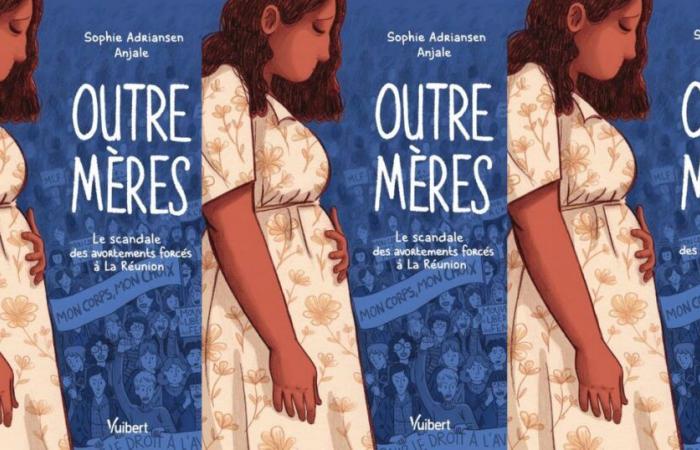Forced abortions, sterilizations without consent… In the 60s and 70s in Reunion, “caregivers” attacked the bodies of women, most of them poor and racialized, even though abortion, at that time, was not was not legal.
Around this scandal, symptomatic of the way France regards its former colonies, Sophie Adriansen and Anjale composed Overseasa powerful graphic novel with a historical-feminist content, which, one foot in the Indian Ocean, one foot in France, interweaves the struggle of some, Reunion Islanders, so that their doctor-executioners are judged, and the fight of others, Parisians, for the legalization of abortion.
Interview with the illustrator Anjale, the Reunion half of the duo.
Non-consensual abortions and sterilizations
Marie Claire : You, who are from Reunion Island, born in the 90s, when did you hear about the non-consensual abortions and sterilizations which took place on the island in the 60s/70s?
Anjali: I couldn't say, it was vague. There is a whole part of the Reunionese population who are not aware of this, another who is but who does not talk about it.
I was aware of it, but without the details of the investigation and the trial that followed.
Sophie Adriansen, who deals in her works with the freedom of women to dispose of their bodies, discovered the affair with the book by Françoise Vergès, The Women's Stomach.
It is sometimes known, but little discussed: there is no transmission of these stories by word.
Does that mean that even today, there is a leaden cover on this subject, in Reunion?
Yes, it's a bit of a taboo subject. The women who were victims of this spoke very little out of shame and fear, and did not want to go back on it. It is sometimes known, but little discussed: there is no transmission of these stories by word.
Documenting the silence
There are also many silent scenes in the work: as if to illustrate this silence?
Yes, and also to make the reader breathe, so that he takes the time to experience the emotions of the characters and to have a little empathy towards them.
In particular Lucie, victim of forced abortion: even if her life, after that, resumes its course, even if there is her daily life, her children, her work, even if she is accompanied to file a complaint, she is extremely alone in this test. So the silent scenes in the comic highlight all this solitude.
How did you document this Reunion of the 60s/70s and how was your drawing informed by it?
Photos of Reunion taken in the 1960s are not easily found on the Internet. I looked for the documentation in the departmental library of Réunion, in Saint-Denis, in books and collections of photos.
I also interviewed people who described to me the lifestyles of that time and what the huts where we lived looked like. I was also able to read the newspaper Testimonialswhich was the organ of the Reunion Communist Party and which really closely followed the forced abortion affair. Part of the comic strip also takes place in Paris at the same time, but there, of course, the graphic references – films, photos, newspapers – are much more accessible.
Read also
October 11, 1972: the day Marie-Claire, a high school student tried for having aborted after a rape, was acquitted thanks to Gisèle Halimi
Being Reunionese
The term “overseas”, which gives, as a play on words, its title to the work, is quite contested, in the sense that it conveys a persistent colonial imagination…
Yes, it is a term which is placed from the metropolitan point of view, since it means “beyond the sea” – whereas we, “Ultramarines”, we do not feel “beyond” something, not ” elsewhere”, we are in our territories! Reunion is France, and yet our populations and our territory are not treated in the same way as in France.
They are treated as if they were there to serve the economy. Overseas Mothers is a title that allows us both to denounce this postcolonial management of overseas territories, and to refer to these mothers who have been deprived of motherhood.
What does it mean to you to be from Reunion Island?
It's a very complicated question because there are lots of ways to be Reunionese and, moreover, all the holidays of all the communities are celebrated by almost everyone there. My dad is Mauritian of Indian origin – Anjale is my middle name, also of Indian origin. My mother comes from mainland France.
I was born and raised in Reunion, but even though I have lived in Lyon for around fifteen years, I know, when I return to the island, that I am at home there.
There is in Overseas some passages in Reunion Creole. You are the illustrator of the work, but we imagine that it is to you that we owe this textual aspect of the work and its linguistic accuracy.
Yes, because for me, it was really important to make heard, in small touches, this Reunion Creole which is imbued with all the communities that arrived on the island gradually, with words, therefore, from French French, Malagasy, Tamil… And thus awaken people's curiosity about our language.
Sophie Adriansen and Anjale – Overmothers. The scandal of forced abortions in Reunion – Ed. Vuibert.
Read also
Nesrine Slaoui and sexism towards North African women: “There is this fantasy of revealing the bodies of so-called oriental women”
France






